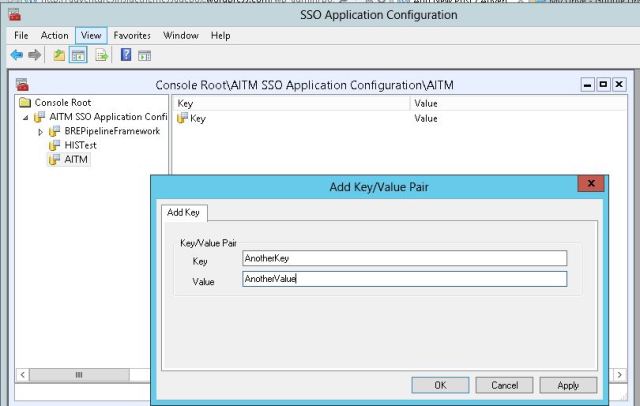A few years ago Microsoft released the SSO Application Configuration MMC snap-in that allows you to add key/value pair configuration information to SSO applications that can be looked up by your BizTalk applications.
Unfortunately those of you who have tried to use the MMC on a BizTalk 2013 environment would have noticed that while the MMC opens and allows you create/delete applications (logical groupings of configuration information which can be secured to relevant parties) it will not allow you to view existing key/value pairs or add/delete key/value pairs. My colleague Mark Brimble has raised the issue with our local Microsoft representatives to hopefully get a fix sometime soon but in the meanwhile we have sought out alternative plans. Trawling TechNet forums will leave you with the sole suggestion of recompiling Richard Seroter’s SSO tool (which was created prior to the Microsoft MMC) in .NET 4.5 with updated references, but based on what I’ve read it appears there are still issues with this.
Upon some investigation (and a good hint from this blog post by my colleague Mahindra) I realized that this is because Microsoft have incremented the assembly version of the Microsoft.EnterpriseSingleSignOn.Interop.dll assembly to 7.0.2300.0 in BizTalk 2013. Sure enough inspecting the SSOMMCSnapIn.dll assembly located in “C:\Program Files (x86)\Microsoft Services\SSO Application Configuration” (might vary if you are on a 32-bit machine etc…) using reflector shows that there is a reference to version 5.0.1.0 of the Microsoft.EnterpriseSingleSignOn.Interop.dll assembly.
Using the assembly redirection method that was referenced in Mahindra’s blog post I updated the SSOMMCSnapIn.dll.config file in the “C:\Program Files (x86)\Microsoft Services\SSO Application Configuration” folder so that it redirects to the updated version of the assembly, and that seemed to do the trick. The config file should be updated so that it looks like the below, you will want to add in everything within the highlighted runtime tag (you can download a copy of the file from here if you want to copy/paste).
You should now once again be able to use the MMC to view/manipulate configuration key/value pairs. Hopefully this workaround will keep you going until we get an official response from Microsoft.






